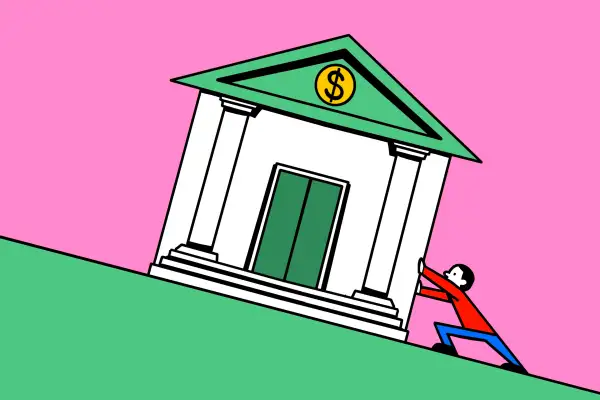I Got My Bank to Waive Overdraft Fees in 5 Minutes. Here's How

It was so much easier than I thought it would be: A phone call that lasted less than five minutes wiped away three crippling, back-to-back, same-day overdraft fees charged by my bank.
Most of us have been in the uncomfortable and seemingly daunting situation of seeing excess, gratuitous, and annoying bank fees piled on our statements for one reason or another. Unexpected circumstances, after all, happen. You might be stranded in a remote spot in need of cash with no ATM branch of your bank near you. A hefty debit charge might have hit you before the funds to cover it came in, or you might have transferred funds at the wrong time or in the wrong amount. Or a walloping one-time expense might have screwed up your financial planning for the month.
But the extra bank fees often associated with these unfortunate events can feel especially crushing while the spreading coronavirus causes economic havoc or at least mounting uncertainty in all our lives. Bills for many will get that much tighter, and unexpected payments will rack up.
That doesn’t mean you don’t have power to work with your bank to come to an understanding. Just as certain cities are asking landlords to put a pause on rent demands, your bank should be (and likely will be, if you’re a loyal customer in good standing) understanding of the financial constraints that may result in pesky fees right now.
How to Negotiate Bank Fees With Your Bank
The truth is these bank fees, like interest rates on credit cards, are always negotiable. And knowing how to properly negotiate is the key to getting them waived.
“The ongoing pandemic is causing a very unfortunate financial situation for many people. Unlike during the 2008 crisis, however, there are more banking options for people trying to avoid being nickel and dimed,” notes Jon Stein, founder and CEO of Betterment, a money management company utilizing online robo-advising.
“Consumers should demand free services such as ATM fees from their banks,” Stein says. “When those institutions don’t show a more consumer-centric mindset and perhaps a little empathy, the only option people really have is to walk. They sadly won’t care when most individual customers leave, but if enough people change providers, we might see real change from the large institutions.” (Betterment touts that it offers higher-than-industry-standard protections, including $1 million in FDIC insurance, unlimited transactions, no balance minimums, and no ATM fees.)
If you’re not used to insisting things from your bank, you may feel in over your head. But the right strategies and words can get you far—including, only if it comes to that, threatening to leave your regular bank.
But before you get there (and hopefully you don’t), here’s a simple approach that has proven effective including in my own experience.
When I most recently called up Bank of America, it was after I was hit with three standard $35 overdraft fees for regular transactions the day before a large deposit was available in my checking account. I’ve found you’ll almost always get further by calling up a bank’s customer service and getting a representative (just be prepared to put your phone on speakerphone so you don’t lose your mind waiting on hold).
First be clear by saying something like, “I incurred fees on my account I would like to be waived.”
Once you reference the fee or fees in question, you may be asked about your current financial status. It’s worth it in these economically volatile times to point out that you’re undergoing surprising and unusual financial demands.
If the bank representative pushes back by saying that a fee is standard policy, emphasize (if it’s true) that you’re a longtime, faithful customer who has brought business to the bank and that your request is an outlier in your history. (If it’s the first time you’ve asked for a fee like this to be waived, make that clear.)
You can even say directly, “I’m hoping for some temporary understanding in an extremely difficult situation.” Or, even more simply, "What can you do to help me?"
If you still get pushback, don’t hesitate to ask to speak to a supervisor. Generally a higher-up in the same department will have more leeway to reduce or waive fees, especially if you’re persistent and firm. The last resort is to suggest you’re ready to walk away from the bank, but it’s best to couch that possibility with language like “I want to know what you can do for me before I leave.”
But also, and this can’t be emphasized enough, be polite. The bank employees you’re talking to deal with these dilemmas regularly, and they’re always more prone to helping out those who don’t scream at or demean them.
We are all, after all, humans. And the coronavirus panic can test our limits. But that also makes this a prime time to negotiate with your bank to diminish or waive excess fees—just show a little compassion and understanding for them, too.
More From Money:
Why Ally Is Money's Best Online Bank Two Years in a Row
Mortgage Rates Are Near Record Lows. Here's How to Figure Out if You Should Refinance